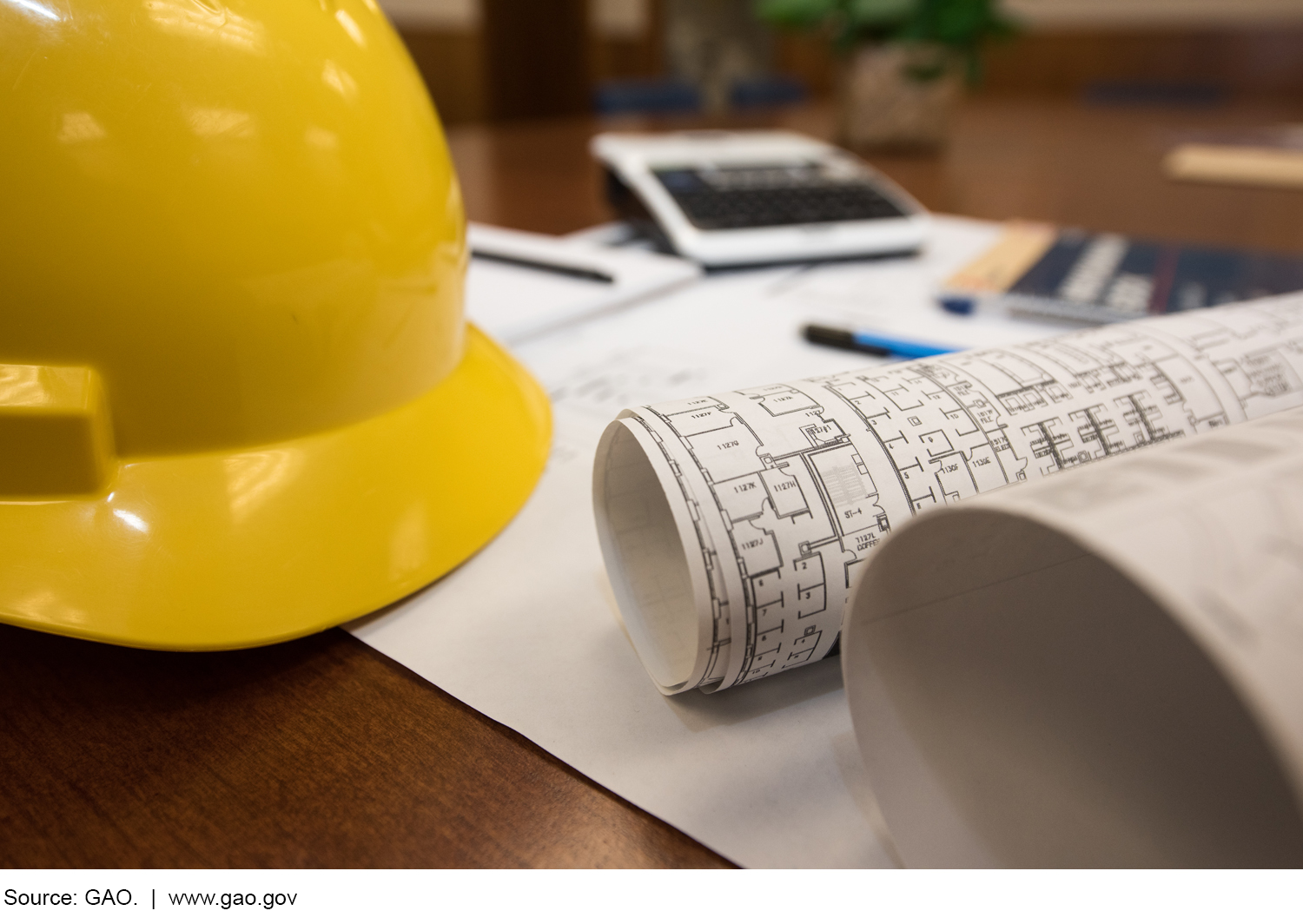Climate Change: Improved Federal Coordination Could Facilitate Use of Forward-Looking Climate Information in Design Standards, Building Codes, and Certifications
Fast Facts
The houses we live in, buildings we work in, and roads and bridges we use daily are supposed to be built to last—whatever the local forecast has in store.
However, design standards and building codes generally use historical climate observations. Forward-looking climate information would help account for the changing frequency and intensity of extreme weather.
Continuing to build with current standards and codes could cost the government billions of dollars in repairs, flood insurance, and disaster relief. We recommend that federal agencies work together to provide forward-looking climate information for consideration in standards and codes.

Photo of hard hat, construction plans, papers and pens on a desk.
Highlights
What GAO Found
Selected standards-developing organizations generally have not used forward-looking climate information—such as projected rainfall rates—in design standards, building codes, and voluntary certifications and instead have relied on historical observations. Further, some organizations periodically update climate information in standards, codes, and certifications, but others do not. Some standards-developing organizations have taken preliminary steps that may lead to the use of forward-looking climate information. For example, in 2015, the American Society of Civil Engineers issued a paper that recommended engineers work with scientists to better understand future climate extremes.
Standards-developing organizations face institutional and technical challenges to using the best available forward-looking climate information in design standards, building codes, and voluntary certifications, according to reports, representatives of these organizations, and federal officials. Institutional challenges include a standards-developing process that must balance various interests and can be slow to change. For example, representatives of some standards-developing organizations told GAO that their members have not expressed interest in standards that use forward-looking climate information. Technical challenges include difficulties in identifying the best available forward-looking climate information and incorporating it into standards, codes, and certifications. For example, representatives from one organization said that climate models provide a wide range of possible temperatures that is difficult to use in their standards.
Agencies have initiated some actions and could take more to help standards-developing organizations address challenges, according to various reports, representatives of standards-developing organizations, and agency officials. For example, in 2015, the National Institute of Standards and Technology (NIST) convened a panel that seeks to identify gaps in standards and codes to make infrastructure more resilient to extreme weather. In addition, officials from the U.S. Global Change Research Program (USGCRP)—which coordinates research across 13 federal agencies—told GAO they have begun discussions with representatives of standards-developing organizations on their climate information needs. In 2015, the Mitigation Framework Leadership Group (MitFLG)—which coordinates hazard mitigation efforts—issued a draft strategy to encourage federal support for more resilient standards and codes. Opportunities exist for additional agency actions that may help address the challenges organizations identified to using forward-looking climate information. Specifically, agencies that address climate issues could improve interagency coordination to help standards-developing organizations address institutional challenges and could provide the best available forward-looking climate information to help them address technical challenges. Federal policy directs agency standards executives—senior-level officials who coordinate agency participation in standards organizations—to coordinate their views when they participate in the same standards activities so as to present, whenever feasible, a single, unified position. The policy also directs the Secretary of Commerce, who has delegated the responsibility to NIST, to coordinate and foster executive branch implementation of the policy governing federal participation in the development of voluntary consensus standards. A governmentwide effort could also present a benefit by reducing the federal fiscal exposure to the effects of climate change.
Why GAO Did This Study
Over the last decade, extreme weather cost the federal government more than $320 billion for, among other things, repairs to federal infrastructure, and according to the President's 2017 budget request, these costs may rise as the climate continues to change. GAO's prior work found that using the best available climate information, including forward-looking projections, can help manage climate-related risks.
Federal, state, local, and private decision makers use design standards, building codes, and voluntary certifications in the construction of infrastructure. Standards-developing organizations, such as professional engineering societies, issue standards, model codes, and certifications.
GAO was asked to review the use of forward-looking climate information by standards-developing organizations. This report examines (1) what is known about the use of such information in standards, codes, and certifications; (2) challenges standards organizations face to using climate information; and (3) actions federal agencies have taken to address such challenges and additional actions they could take. GAO analyzed laws and policies, reviewed reports, and interviewed representatives from 17 selected organizations and officials from agencies that address climate issues.
Recommendations
GAO recommends that NIST, in consultation with USGCRP and MitFLG, convene an ongoing governmentwide effort to provide forward-looking climate information to standards organizations. Commerce neither agreed nor disagreed with GAO's recommendation.
Recommendations for Executive Action
| Agency Affected | Recommendation | Status |
|---|---|---|
| Department of Commerce |
Priority Rec.
To help reduce federal fiscal exposure by enhancing the resilience of infrastructure to extreme weather, the Secretary of Commerce, through the Director of NIST, in consultation with MitFLG and USGCRP, should convene federal agencies for an ongoing governmentwide effort to provide the best available forward-looking climate information to standards-developing organizations for their consideration in the development of design standards, building codes, and voluntary certifications. |
As of April 18, 2024, NIST officials stated they have taken steps to provide the best available forward-looking climate information to standards-developing organizations by assessing priority federal agency needs for climate data and projections. We will review this assessment once it is issued and determine if it is responsive to our recommendation.
|
